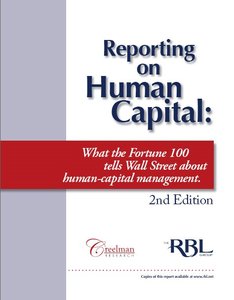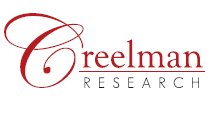GE, IBM Best at Human Capital Reporting
Published 02-22-07
Submitted by Creelman Research

February 22, 2007- An important part of CSR is reporting on human capital. A thorough study of what Fortune 100 companies report on human capital has been released by Creelman Research and The RBL Group. The study shows GE and IBM are doing the best job of reporting on human capital intangibles.
"When you look at GE and IBM from a human capital perspective you come away valuing the companies more highly than you would if you only looked at the financials," said David Creelman, CEO of Creelman Research.
Intel, UPS, and Wells Fargo were also in the top 5 in reporting on human capital.
Dave Ulrich, co-author of The HR Value Proposition warns these are still early days, "I’m delighted to see these top companies taking human capital and organizational capability seriously, but they still have a way to go-and most of the Fortune 100 are far behind."
While GE, IBM, Intel, UPS, and Wells Fargo clearly report a strong position in human capital management, there were 29 Fortune 100 companies whose reporting on HR was so poor that it left a bad impression. "If a company doesn’t show any evidence of good human capital practices or outcomes then stakeholders assume that they’re not investing for future results and begin to lose confidence." said Creelman.
If there is one thing that makes GE stand out it is that they seem to know why they are reporting what they are reporting. They don’t report on human capital matters just because it’s fashionable, they do it because it highlights how they are executing their strategy and they always try to provide some sort of metric.
IBM’s reporting is similarly impressive because they have a clear focus: innovation. IBM makes a point of highlighting how their innovative HR practices infuse the company.
In contrast ExxonMobil, who failed to make the top 5, makes the reasonable claim that their culture gives them a competitive advantage, but does not provide information on how they assess, develop, or measure their culture. "As an investor or Board member you are looking for some evidence that critical assets are not deteriorating," said Ulrich.
The study, Reporting on Human Capital: What the Fortune 100 Tells Wall Street About Human-Capital Management, is a solid resource for CSR professionals who want to provide more useful information to stakeholders about human capital.
More information about the report can be found at www.rbl.net or http://creelmanresarch.com. David Creelman can be reached at dcreelman@creelmanresearch.com
About the Creelman Research
Creelman Research specializes in research and writing on human capital management. David Creelman. He is currently helping companies improve how they report on human capital to the Board, financial markets and other stakeholders.
About The RBL Group
The RBL Group specializes in helping clients deliver the strategic HR agenda. The firm’s founding partnership "“ Dave Ulrich and Norm Smallwood "“ are particularly well-respected thought leaders whose Harvard Business Review articles on capability have helped companies tackle the tricky subject of intangibles in a concrete way.

Creelman Research
Creelman Research
Creelman Research specializes in writing and research on human capital. In the world of CSR our special interest is reporting on human capital. We help companies improve how they report to various stakeholdersa and gather better human capital metrics. We have partnered with The RBL Group on a study on what the Fortune 100 tells Wall Street about human capital (www.rbl.net). The RBL Group was co-founded by leading HR thinker, Dave Ulrich. email: dcreelman@creelmanresearch.com or: creelmanresearch@gmail.com
More from Creelman Research

